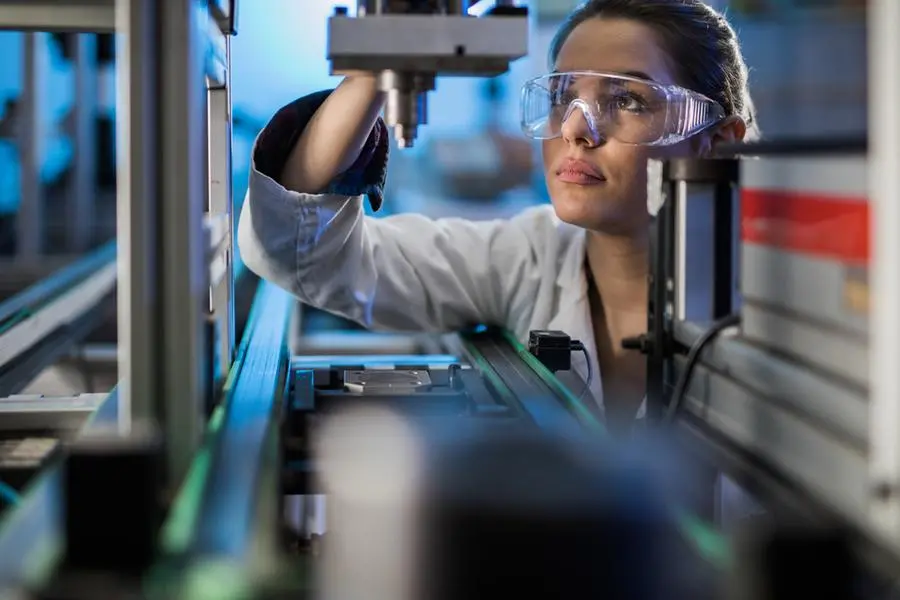PHOTO
RIYADH — The Saudi students science and engineering team scripted a new history, bagging 22 medals at the recently concluded Regeneron International Science and Engineering Fair (ISEF 2022).
The team, which comprised 35 boy and girl students representing 11 educational departments in various regions of the Kingdom, performed superbly at the prestigious international event held at the Georgia World Congress Center, Atlanta in the United States of America from May 7 to 13.
The Saudi contingent turned in an outstanding performance with their qualitative innovative projects in promising fields especially artificial intelligence, renewable energy, pharmaceuticals, and environment.
The Saudi team maintained its clear superiority over many other competitors from other parts of the world. The talented Saudi teens were selected from among 40 winners of major prizes in the National Olympiad for Scientific Creativity titled “Ibdaa 2022”.
This is one of 19 different programs offered annually by King Abdulaziz and His Companions Foundation for Giftedness and Creativity (Mawhiba) to talented students who have been identified annually in the Kingdom after meticulous and meritorious screening and talent search.
With these global achievements, Saudi Arabia raised its credit of winning special prizes in the ISEF to 104 awards, including 68 grand awards and 36 special awards ever since the start of its participation in the fair since 2007.
The following boy and girl students are the Saudi achievers at ISEF 2022:
Abdullah Al-Ghamdi won first place in the field of energy for his qualitative project titled “Engineering a dual-functional metal-organic framework for the production and storage of hydrogen with high efficiency and effectiveness.”
Al-Ghamdi also bagged the award for the best research scientist in the world, in the competition with 1,700 other research students.
Dana Al-Eithan secured first place in the field of chemistry for her project “Selective production of hydrogen from formic acid using an effective special catalyst for energy generation.”
Mansour Al-Marzouki bagged second place in the field of environmental engineering for his project “Designing a multifunctional metal-organic framework for carbon dioxide capture and optical conversion”.
Faisal Al-Khuwaiter won second place in the field of plant sciences for his project “Studying beneficial bacteria from olive trees to combat drought.”
Mawadda Ali achieved third place in the field of social and behavioral sciences for her qualitative project “A new application in the use of 3D printing to diagnose drug doses”.
Elaf Bint Muaiqel secured third place for her qualitative project “Enhancing the performance of photoelectric water separation for a catalyst (Cu2O-CuO) of low thickness.
Tahani Ahmed achieved third place in the field of materials science for her qualitative project “Development of highly efficient and non-toxic perovskite materials (CsSnl3) for the collection of solar and thermal energy”.
Ahmed Buhaisi secured third place in the field of plant sciences for his qualitative project “Control of parasitic infestations by using cytokinin in various formulas with fluridone and ethylene precursor”.
Abdullah Al-Hamadat obtained third place in the field of energy for his project “A new approach using iron and cobalt oxides as photoelectric catalysts for water separation throughout the day”.
Rafaa Qanash achieved fourth place in the field of engineering technologies for her qualitative project “Studying the properties of self-ignition for hydrogen in a pressure-dependent ignition engine.
Faisal Al-Ghamdi achieved fourth place in the field of botany for his project “Studying the interaction of mutations of growth proteins in plants to control root growth”.
Lamar Al-Kaka won fourth place in the field of earth and environmental sciences for her project “Estimation of capillary pressure” of oil reservoirs using nuclear magnetic resonance (NMR).
Areej Bajwa achieved fourth place in the field of chemistry for her project “Developing a hybrid compound as a single source for the production of nanocrystals of manganese oxide and sulfide”.
Mariyam Al-Ghamdi won fourth place in the field of chemistry for her qualitative project “Improving the performance of photoelectric catalysis of WO3 decorated with carbon dioxide,” by using electrodeposition to split water.
Mariyam Al-Abdulbaqi won fourth place in the field of transitional medical sciences for her qualitative project “Benzodioxin derivatives as dual inhibitors of a number of alpha enzymes for the management of type 2 diabetes.”
© Copyright 2022 The Saudi Gazette. All Rights Reserved. Provided by SyndiGate Media Inc. (Syndigate.info).





















